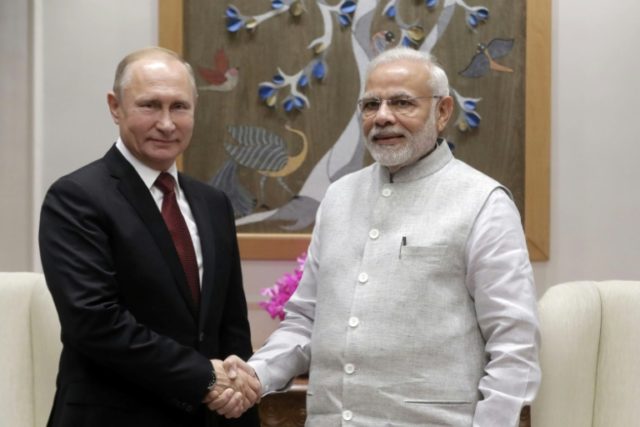Russia on Friday awarded Indian Prime Minister Narendra Modi the Order of St. Andrew, the highest civilian award the Russian Federation offers. Modi received the award for “exceptional services in promoting a special and privileged strategic partnership between Russia and India.”
Modi responded by saying he was “honored to receive this prestigious award,” offering his thanks to Russian President Vladimir Putin and the Russian people.
“The foundations of India-Russia friendship are deep and the future of our partnership is bright,” said Modi. “Extensive cooperation between our nations has led to extraordinary outcomes for our citizens.”
The Times of India listed some previous foreign recipients of the award, including Chinese Communist Party leader Xi Jinping, Kazakhstan’s President Nursultan Nazarbayev, and Azerbaijan’s President Geydar Aliev. Foreign honorees generally travel to Moscow for a formal ceremony at the St. Andrew Hall of the Grand Kremlin Palace.
Modi will probably appreciate the timing of Russia’s announcement, arriving as it does at the beginning of India’s protracted election season.
Putin’s gesture of support for Modi could be seen as an effort to sew up a long and complex Russia-India relationship that seems constantly on the verge of either fusing into a tighter strategic alliance or coming apart over irreconcilable differences, as summarized by the Diplomat on Friday:
In fact, while India and Russia have had a long and warm relationship historically and Russia remains an important strategic partner (it is one of only two countries India has an annual bilateral summit with, the other being Japan), structural trends are pulling them in different directions.
Part of it has to do with perceptions on both sides. On India’s side, it can at times appear not to acknowledge the reality that Russia needs China far more than it needs India, and that its own diversification of partners in both the economic and security domains can also raise concerns in Moscow and complicate bilateral dealings. On Russia’s side, there is at times not enough of an appreciation for India’s strategic considerations, including its sensitivities toward China, as well as an acknowledgment that some of Moscow’s foreign policy activities can cause headaches in New Delhi.
But developments have also accelerated these perceptions as well. Russia’s adventurism abroad, including in Ukraine, China’s rise and its increasing convergence with Russia as it does so, rising U.S. competition with both Beijing and Moscow as it has gradually warmed to New Delhi, and upped conversation on the Indo-Pacific and the divergent approaches by India and Russia have all contributed to this.
This impacts India’s relationship with the United States as well since the U.S. has major economic and strategic interests with India as well. A little tooth-grinding at the State Department over Modi accepting friendship awards from Putin – and buying $7 billion worth of heavy military hardware from him, including the same surface-to-air missiles that currently have Turkey in hot water with Washington – is the price to be paid for having India as a major regional ally against China and a check on Pakistan.
The State Department might need to call in a crack team of emergency dentists if India used its Russian missiles to shoot down a Pakistani F-16. Russian competition for India’s energy sector, both gas and nuclear, is also a strategic concern because it helps Russia achieve its objective of weakening U.S. sanctions as an instrument of foreign policy. Putin has plenty of reasons to celebrate Modi’s award-winning friendship right now.

COMMENTS
Please let us know if you're having issues with commenting.